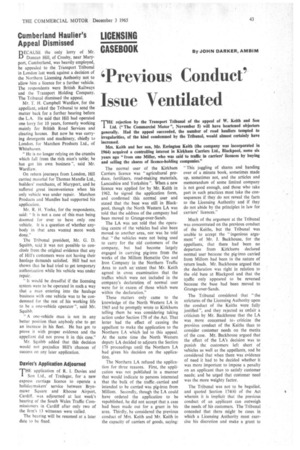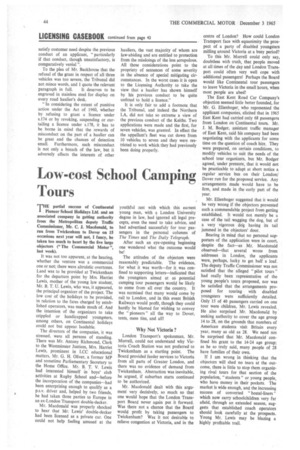'Previous Conduct' Issue Ventilated
Page 45

Page 46

If you've noticed an error in this article please click here to report it so we can fix it.
THErejection by the Transport Tribunal of the appeal of W. Keith and Son rejection (" The Commercial Motor ", November 5) will have heartened objectors generally. Had the appeal succeeded, the number of road hauliers tempted to irregularities, of the kind condemned by the Tribunal, would almost certainly have increased.
Mrs. Keith and her son, Mr. Errington Keith (the company was incorporated in 1964) acquired a controlling interest in Kirkham Carriers Ltd., Blackpool, some six years ago "from one Miller, who was said to traffic in carriers' licences by buying and selling the shares of licence-holding companies."
The normal user of the Kirkham Carriers licence was "agricultural produce, fertilizers, road-making materials, Lancashire and Yorkshire ". When a new licence was applied for by Mr. Keith in 1962. he signed the application form, and confirmed this normal user and stated that the base was still in Blackpool, though the North Western LA was told that the address of the company had been moved to Grange-over-Sands.
The LA was not told that the operating centre of the vehicles had also been moved, to another area, nor was he told that "the' vehicles were not being used to carry for the old customers of the company, but had become largely engaged in carrying pig-iron from the works of the Millom Hematite Ore and Iron Company in the Northern Traffic Area to such anextent that Mr. Keith agreed in cross examination that the traffics which were not included in the company's declaration of normal user were far in excess of those which were within the declaration."
These matters only came to the lcnowledge of the North Western LA in 1965 and he promptly wrote to Kirkhams telling them he was considering taking action under Section 178 of the Act. That letter had the effect of causing the appellant to make the application to the Northern LA which led to this appeal. At the same time the North Western deputy LA decided to adjourn the Section 178 proceedings until the Northern LA had given his decision on the application.
The Northern LA refused the application for three reasons. First, the application was not published in a manner that would indicate to persons interested that the bulk of the traffic, carried and intended to be carried was pig-iron from Millom. Secondly, though the LA could have ordered the application to be republished, he did not accept that a case had been made out for a grant in his area. Thirdly, he considered the previous conduct of Mrs. Keith and Mr. Keith in the capacity of carriers of goods, saying: "This juggling of shares and handing over of a minute book, sometimes made up, sometimes not, and the articles and memorandum of some limited company is not good enough, and those who take part in such practices must take the consequences if they do not reveal the facts to the Licensing Authority and if they do not abide by the principles in law for carriers' licences."
Much of the argument at the Tribunal was concentrated on the previous conduct of the Keiths, but the Tribunal was unable to accept the "ingenious argument" of Mr. J. Backhouse, for the appellants, that there had been no departure from Kirkhams declared normal user because the pig-iron carried from Millom had been in the nature of return loads. Mr. Backhouse argued that the declaration was right in relation to the old base at Blackpool and that the traffic only appeared to be reversed because the base had been moved to Grange-over-Sands.
The Tribunal considered that "the strictures of the Licensing Authority upon the conduct of the Keiths were fully justified ", and they rejected as unfair a criticism by Mr. Backhouse that the LA was more concerned to• criticize the previOus conduct of the Keiths than to consider customer needs on the merits of the case. Mr. Backhouse argued that the effect of the LA's decision was to punish the customers left short of vehicles as well as the appellants, and he considered that when there was evidence of need it had to be decided whether it was more important to impose a penalty on an applicant than to satisfy customer needs; and he urged that customer need was the more weighty factor.
The Tribunal was not to be beguiled, and quoted Section 174(4) of the Act wherein it is implicit that the previous conduct of an applicant can outweigh the needs of his customers. The Tribunal conceded that there might• be cases in which a Licensing Authority must exercise his discretion and make a grant to
satisfy customer need despite the previous conduct of an applicant, "particularly if that conduct, though unsatisfactory, is comparatively venial ".
To the plea of Mr. Backhouse that the refusal of the grant in respect of all three vehicles was too severe, the Tribunal did not mince words, and I quote the relevant paragraph in full. It deserves to be engraved in stainless steel for display on every road haulier's desk.
"In considering the extent of punitive action under the Act of 1960, whether by refusing to grant a licence under 8.174 or by revoking, suspending or curtailing a licence under s.178, it has to be borne in mind that the rewards of misconduct on the part of a haulier can be great and the chances of detection small. Furthermore, such misconduct is not only a breach of the law, but it adversely affects the interests of other
hauliers, the vast majority of whom are law-abiding and are entitled to protection from the misdoings of the less scrupulous. All these considerations point to the propriety of sentences of some severity in the absence of special mitigating circumstances. In the worst cases it is open to the Licensing Authority to take the view that a haulier has shown himself by his previous conduct to be quite unfitted to hold a licence."
It is only fair to add a footnote, that the Tribunal, and indeed the Northern LA, did not take so extreme a view of the previous conduct of the Keiths. Two applications were made and the first, for seven vehicles, was granted. In effect the the appellant's fleet was cut down from 10 vehicles to seven and they were restricted to work which they had previously been doing properly.
















































































































































































